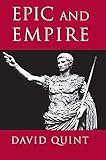Epic and Empire : Politics and Generic Form from Virgil to Milton / David Quint.
Material type: TextSeries: Literature in History ; 1Publisher: Princeton, NJ : Princeton University Press, [2021]Copyright date: ©1993Description: 1 online resource (444 p.) : 1 figContent type:
TextSeries: Literature in History ; 1Publisher: Princeton, NJ : Princeton University Press, [2021]Copyright date: ©1993Description: 1 online resource (444 p.) : 1 figContent type: - 9780691222950
- Epic poetry -- History and criticism
- Literary form
- Literature and history
- LITERARY CRITICISM / European / General
- Acoma pueblo
- Ahl, Frederick
- Ancients and Modems
- Ascoli Piceno
- Barchiesi, Alessandro
- Barlow, Joel
- Bentley, Richard
- Borges, Jorge Luis
- Brecht, Bertolt
- Brooks, Peter
- Caesar, Julius
- Caesarion
- Carausius
- Cicero
- Cleanthes
- Dias, Bartolomeu
- Donation of Constantine
- Duggan, Joseph
- Eikon Basilike
- Empson, William
- Este family
- Fawkes, Guy
- Fowler, Alastair
- Fronde
- Getto, Giovanni
- Guarini, Battista
- Góis, Damião de
- Hartman, Geoffrey
- Herodotus
- Horace
- Jamestown settlement
- Josephus
- Kalevala
- Lagos, Ramona
- Leo X, Pope
- Loyola, Ignatius
- Martello, Francesco
- Michel, Francisque
- Moctezuma
- Naevius
- Napoleon Bonaparte
- New Historicism
- Onate, Juan de
- Parthia and Parthians
- Peisistratus
- Polybius
- Quintilian
- anabaptism
- census
- civil war
- history and narrative
- imitation
- 809.1/32 20
- PN1303
- PN1303
- online - DeGruyter
| Item type | Current library | Call number | URL | Status | Notes | Barcode | |
|---|---|---|---|---|---|---|---|
 eBook
eBook
|
Biblioteca "Angelicum" Pont. Univ. S.Tommaso d'Aquino Nuvola online | online - DeGruyter (Browse shelf(Opens below)) | Online access | Not for loan (Accesso limitato) | Accesso per gli utenti autorizzati / Access for authorized users | (dgr)9780691222950 |
Browsing Biblioteca "Angelicum" Pont. Univ. S.Tommaso d'Aquino shelves, Shelving location: Nuvola online Close shelf browser (Hides shelf browser)

|

|

|

|

|

|

|
||
| online - DeGruyter Athens at the Margins : Pottery and People in the Early Mediterranean World / | online - DeGruyter In Pursuit of the Perfect Portfolio : The Stories, Voices, and Key Insights of the Pioneers Who Shaped the Way We Invest / | online - DeGruyter Robert’s Rules of Order, and Why It Matters for Colleges and Universities Today / | online - DeGruyter Epic and Empire : Politics and Generic Form from Virgil to Milton / | online - DeGruyter Hobbesian Moral and Political Theory / | online - DeGruyter The Cult of the Virgin Mary : Psychological Origins / | online - DeGruyter Before the Melting Pot : Society and Culture in Colonial New York City, 1664-1730 / |
Frontmatter -- CONTENTS -- ACKNOWLEDGMENTS -- INTRODUCTION -- PART ONE. EPIC AND THE WINNERS -- ONE. EPIC AND EMPIRE: VERSIONS OF ACTIUM -- TWO. REPETITION AND IDEOLOGY IN THE AENEID -- PART TWO. EPIC AND THE LOSERS -- THREE. THE EPIC CURSE AND CAMOES' ADAMASTOR -- FOUR. EPICS OF THE DEFEATED: THE OTHER TRADITION OF LUCAN, ERCILLA, AND D'AUBIGNE -- PART THREE. TASSO AND MILTON -- FIVE. POLITICAL ALLEGORY IN THE GERUSALEMME LIBERATA -- SIX. TASSO, MILTON, AND THE BOAT OF ROMANCE -- SEVEN. PARADISE LOST AND THE FALL OF THE ENGLISH COMMONWEALTH -- EIGHT. DAVID'S CENSUS: MILTON'S POLITICS AND PARADISE REGAINED -- PART FOUR. A MODERN EPILOGUE -- NINE. OSSIAN, MEDIEVAL "EPIC," AND EISENSTEIN'S ALEXANDER NEVSKY -- NOTES -- INDEX
restricted access online access with authorization star
http://purl.org/coar/access_right/c_16ec
Alexander the Great, according to Plutarch, carried on his campaigns a copy of the Iliad, kept alongside a dagger; on a more pronounced ideological level, ancient Romans looked to the Aeneid as an argument for imperialism. In this major reinterpretation of epic poetry beginning with Virgil, David Quint explores the political context and meanings of key works in Western literature. He divides the history of the genre into two political traditions: the Virgilian epics of conquest and empire that take the victors' side (the Aeneid itself, Camoes's Lusíadas, Tasso's Gerusalemme liberata) and the countervailing epic of the defeated and of republican liberty (Lucan's Pharsalia, Ercilla's Araucana, and d'Aubigné's Les tragiques). These traditions produce opposing ideas of historical narrative: a linear, teleological narrative that belongs to the imperial conquerors, and an episodic and open-ended narrative identified with "romance," the story told of and by the defeated. Quint situates Paradise Lost and Paradise Regained within these rival traditions. He extends his political analysis to the scholarly revival of medieval epic in the late eighteenth and nineteenth centuries and to Sergei Eisenstein's epic film, Alexander Nevsky. Attending both to the topical contexts of individual poems and to the larger historical development of the epic genre, Epic and Empire provides new models for exploring the relationship between ideology and literary form.
Mode of access: Internet via World Wide Web.
In English.
Description based on online resource; title from PDF title page (publisher's Web site, viewed 07. Nov 2022)


